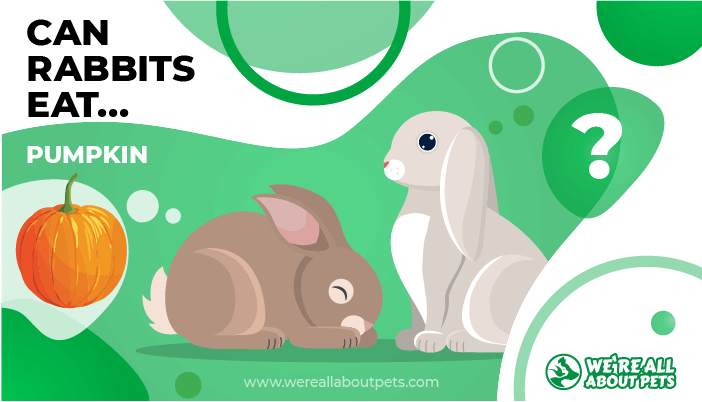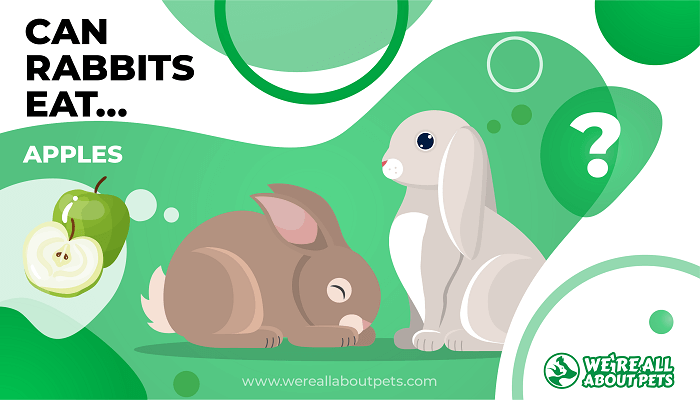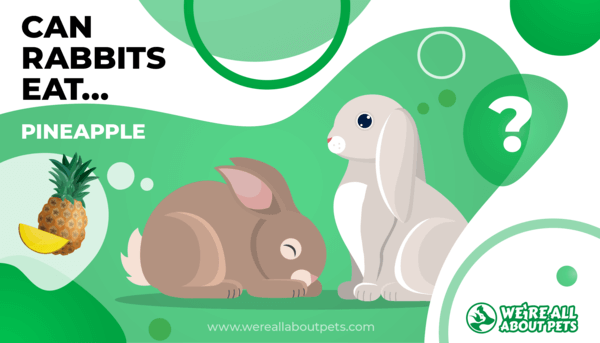10 Important Do’s And Don’ts For Rabbits
This page contains affiliate links. We may earn money or products from the companies mentioned in this post through our independently chosen links, which earn us a commission. Learn More
Rabbits can be wonderful pets as well as great companions. They are typically very social animals, they are generally very clean, and they usually don’t require a lot of space.
Lots of people adopt rabbits simply because they look so cute and cuddly, but many adopters think that rabbits have similar behaviors and needs as dogs and cats, which is far from the truth.
Rabbits are considered exotic animals and have some very specific requirements that cannot be ignored. So, whether you’re considering adopting or already own rabbits and are looking for some insights, this article will give you some helpful tips about rabbit do’s and don’ts.
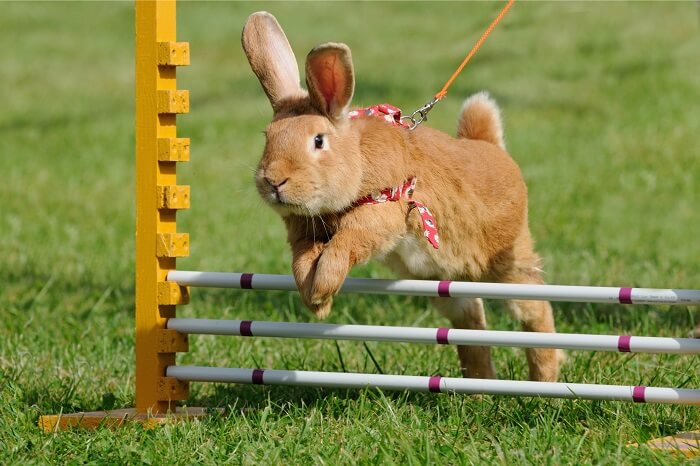
At a Glance: Rabbit Do’s
- Correct Diet- The correct foods and fresh water are essential for a rabbit’s health. So, always keep a steady supply of fresh hay on hand, and make sure that your rabbit’s water bowls and bottles are cleaned regularly.
- Habitats- Rabbits need a place to call their own, even if they are free-roaming in your home. Giving your rabbits a hutch or habitat will help them feel safe and secure, and offer them a little privacy once in a while.
- Toys- Toys promote natural behaviors as well as encouraging physical movement and exercise. Also, toys can help prevent rabbits from chewing and shredding your furniture, and other valuables around your home.
- Litter Box- Like all animals, rabbits need to go to the bathroom now and then, so it’s important to provide them with a litter box. And, keeping your rabbits’ litter box clean will help to keep your rabbits clean, too.
- Proper Grooming- Even though rabbits are generally very clean animals, they still need a little help once in a while. So, be sure to brush them often to avoid mats and excess shedding, and also be sure to trim their nails on a regular basis.
At a Glance: Rabbit Don’ts
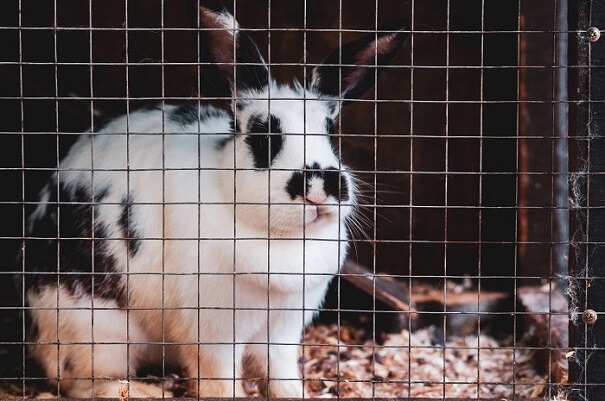
- Overfeeding- Pellets and rabbit treats can be a good supplement to a rabbit’s diet, but giving them too much can cause them to ignore their healthier foods, which can potentially lead to obesity and digestive issues.
- Uncomfortable Contact- Rabbits are usually social animals, but they typically don’t like being touched on their chins, bellies or tails. Also, they don’t always like being picked up or held, so be prepared for them to respond unkindly if you force yourself upon them.
- Unsafe Environment- Make sure that you keep all electrical cords and cables out of your rabbit’s reach. Cords and cables are very tempting for rabbits to chew on, and they can be very harmful to them if digested.
- Not Spaying and Neutering- Regardless of how many rabbits you have, having them fixed can give them health and behavioral benefits. Spaying or neutering your bunnies can reduce their risk of testicular cancer, decrease aggressive behavior and prevent overbreeding.
- Loneliness- Though rabbits tend to be very social, they usually do better with companions. If you are considering adopting one, you should definitely consider adopting two to provide them with a happier existence.
Things to Keep in Mind with Rabbit Do’s and Don’ts
In this article, we’ll expand on some of these important things to consider with rabbit do’s and don’ts. And, remember, all rabbits have their own unique personalities, so you may have to do some experimenting to discover what works best for your bunnies, and what works best for you. Still, rabbits can enhance almost anyone’s life, and you can definitely enhance the lives of the bunnies that you adopt.
Rabbit Do’s
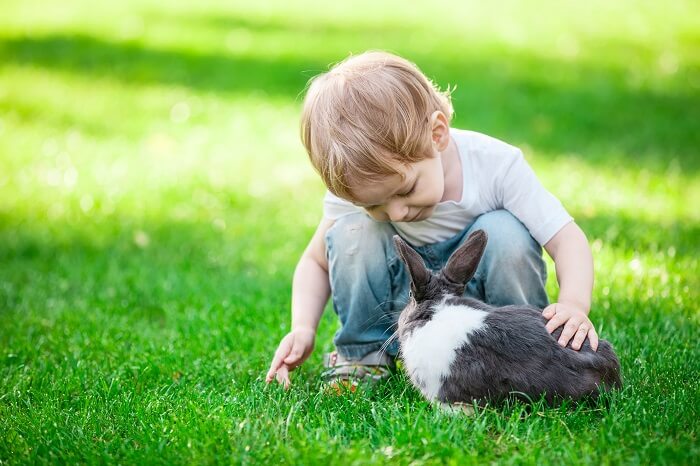
1. Give your Rabbit the Correct Diet
Hay should constitute approximately 80% of a rabbit’s diet, so it’s very important that you always have a steady supply of fresh, quality hay on hand. In addition to hay, providing your bunnies with a helping of fresh, leafy greens once or twice a day gives them extra nutrients to help them thrive. And, carefully measured helpings of commercial pellets can be an additional source of nutrients.
And, whether your rabbits drink from a bowl or from a water bottle, pay close attention to the freshness and cleanliness of their water. Not only should you make sure that they have an ample supply of water, but it’s also important to clean and disinfect their bowls and bottles on a regular basis.
2. Rabbits Need a Habitat
Even if your rabbits are free-roaming, they still require their own space, and giving them a hutch or a habitat will provide them the right kind of living environment. Hutches and habitats give bunnies a feeling of safety and security. Plus, rabbits like a little privacy now and then.
Multi-level hutches are preferable because they encourage added movement and exercise, but one-level habitats are also acceptable, as long as they have flat bottoms. Rabbits don’t have protective padding on their paws, and a wire-bottom floor can be become very uncomfortable and even unhealthy for rabbits over time.
3. Toys are Important for Rabbits
Toys are a very important part of your rabbit’s livelihood, as they encourage natural behaviors such as digging, chewing and chin rubbing, along with promoting physical movement and exercise. Also, toys can help prevent rabbits from chewing and shredding your furniture and other valuables around your home.
But, perhaps most importantly, toys allow your rabbit to simply have some fun and enjoy a little happiness now and then. They can definitely enhance your rabbit’s life while providing emotional and intellectual stimulation, as well as giving them a sense of accomplishment.
4. Rabbits Require a Litter Box
Although rabbits are generally very clean animals and spend a lot of time grooming themselves, they still require a litter box when nature calls. So, providing them with a litter box with quality litter or bedding is extremely important.
There are several varieties of litter and bedding, so you may have to do some experimenting to find out what your rabbits like best. Either way, it’s extremely important that you keep their litter box clean and change out the litter or bedding on a regular basis. Also, bunnies like to lounge in their litter boxes, which makes keeping them clean all the more important.
5. Groom Your Rabbits Regularly
As mentioned, rabbits like to keep themselves clean and spend a lot of time grooming themselves. However, this doesn’t mean that they don’t need a little help once in a while in that regard. Rabbits tend to shed a lot, and excess hair can lead to mats and, rabbits can inhale and ingest excess hair, which can lead to respiratory and digestive issues.
So, depending on the length of your rabbit’s fur, you should brush them anywhere from 1-4 times per week. Also, if your rabbit’s claws get too long, they can become very uncomfortable for them, so pay attention to their length and clip them when needed.
Rabbit Don’ts
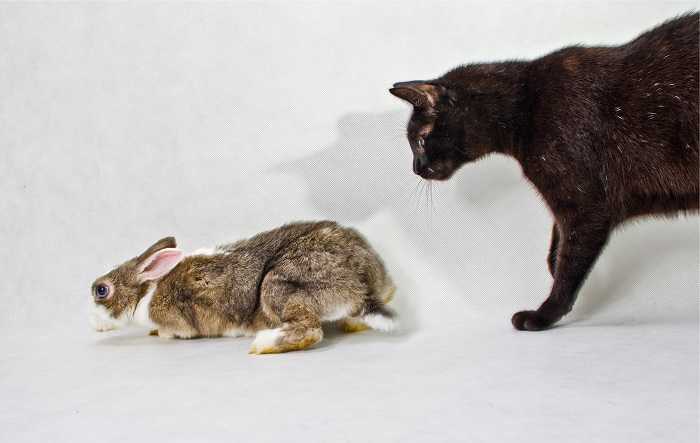
1. Don’t Overfeed with Treats & Pellets
As previously mentioned, fresh hay should be about 80% of a rabbit’s diet, and fresh, leafy greens provide them with additional nutrients. Hay and leafy greens are loaded with fiber and vitamins to help your bunnies thrive. However, treats and pellets can provide extra benefits if fed in the correct portions.
But, treats and pellets can often be fatty for rabbits, as well as filling up their bellies, which can cause them to ignore their healthier foods. Rabbits absolutely love crunching on treats and pellets, so carefully measure them out, and don’t give too many to your bunnies.
2. Be Careful with Physical Contact
Rabbits are absolutely some of the cutest, cuddliest animals that anyone has ever seen, but they also enjoy their personal space, so it’s important to respect their boundaries. Like most animals, bunnies enjoy some personal attention on occasion, and they usually enjoy being gently stroked on their heads and down their backs.
However, if you pick them up and try to hold them, be prepared for some wiggling, kicking and even biting. Also, rabbits don’t typically like being touched on their chins, bellies or tails, so definitely be respectful of those areas.
3. Not Keeping Your Home Safe
Regardless of their age, rabbits have a natural tendency to chew on things to help keep their teeth well-groomed, and this often includes things that aren’t food. It’s very common for bunnies to chew on wood and paper products, which are generally not harmful to them due to their evolved digestive systems.
But, other things that rabbits like to gnaw on are electrical cords and cables. If your bunnies have access to these things, there’s a chance that they might nibble on them if left unattended. Not only will this be an inconvenience for you, but chewing on cords and cables can potentially make your rabbits sick, as well as running the risk of them getting an electric shock.
4. Not Spaying and Neutering Your Rabbits
Rabbits are very efficient breeders and can produce litters at an alarming rate. If you have unfixed male and female rabbits together, nature will most likely take its course and, quicker than you think, you’ll find yourself with several extra mouths to feed.
If you’re not prepared for this and don’t get your rabbits fixed, you could set yourself up for a lot of headaches. Also, many rabbit owners think that if they only have one rabbit they shouldn’t worry about spaying or neutering them. But, even with solitary rabbits, spaying and neutering can provide them with health and behavioral benefits, including reducing the risk of testicular cancer and preventing aggressive behavior.
5. Keeping Your Rabbits Solitary
A single rabbit can often times be perfectly content on its own. They are generally social animals and tend to thrive on attention. However, rabbit owners usually have a limited amount of time to spend with their bunnies on a daily basis, and bored and lonely rabbits can have a tendency to display self-destructive behavior.
And, because rabbits tend to be very social, they usually do better with companions. So, if you have a single rabbit or are considering adopting one, you should definitely consider adopting another one to provide them with a happier existence.
Final Thoughts
Rabbits can sometimes be complicated and mysterious animals, but they can still make wonderful pets if taken care of correctly. Providing them with a proper diet, habitat, toys and a litter box, and keeping them well-groomed are essential things that contribute to their health and happiness.
On the other hand, be careful about overfeeding them the wrong foods and handling them incorrectly, make sure that they have a safe environment, are spayed or neutered, and that they aren’t displaying any signs of loneliness.
Following these tips can help give your rabbits a happy and healthy life, and prevent you from facing a lot of difficulties in the long run.

